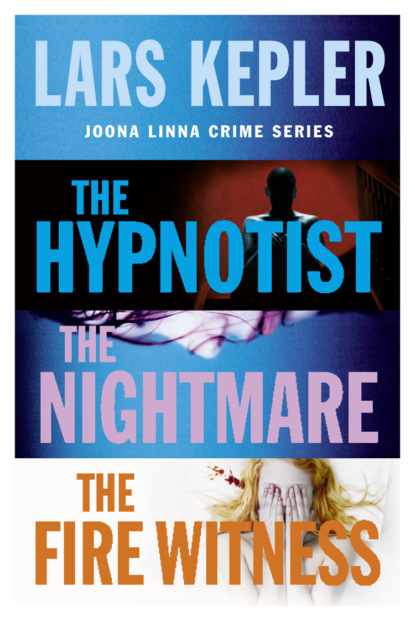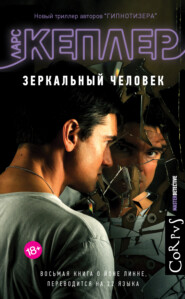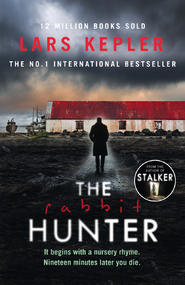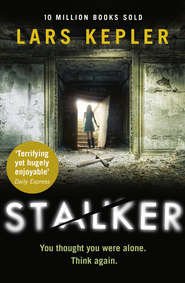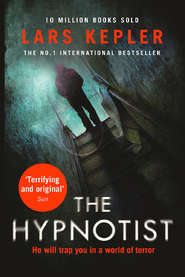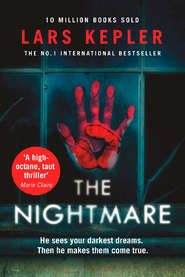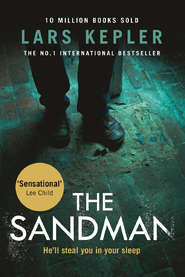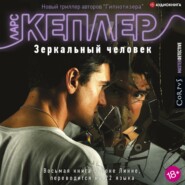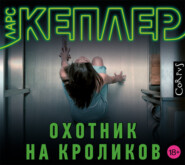По всем вопросам обращайтесь на: info@litportal.ru
(©) 2003-2025.
✖
Joona Linna Crime Series Books 1-3: The Hypnotist, The Nightmare, The Fire Witness
Настройки чтения
Размер шрифта
Высота строк
Поля
Joona hears him walk away, followed by the squeak of a door. Then there is an exchange of words, and something bangs. Joona looks at his watch. He’s already been at the hospital for ten minutes.
He heads down to the main door, keeping the phone to his ear.
“Kronoberg,” says a genial voice.
“Joona Linna, National CID. I need to know the status of one of your detainees: Evelyn Ek,” he says briefly.
“Evelyn Ek,” says the voice thoughtfully. “Right, yes. We let her go; it wasn’t easy. She wanted to stay here.”
“And you just put her on the street?”
“No, no, the prosecutor was here; she’s in”—Joona can hear pages turning—“she’s in one of our safe apartments.”
“Good,” he says. “Put some officers outside her door. Do you hear me?”
“We’re not idiots.”
Joona finds Carlos, who is intently studying something on the screen of his laptop. He tries to get his attention but when he fails he just keeps going, out through the glass doors.
On Joona’s police radio, Omar at Central Control is repeating the code word Echo, the designation for the deployment of dog units. Joona guesses that they have traced most of the cars by this time, with no results.
He wanders over to the abandoned walker, left at the bus stop, and looks around. He blots out the people who are watching from the other side of the police cordon, he blots out the flashing blue lights and the agitated movements of the police officers, he blots out the flashing cameras of the journalists, and instead he allows his gaze to roam over the car park and in between the various buildings of the hospital complex.
Joona sets off, stepping over the fluttering tape cordoning off the area. He pushes his way through the group of curious onlookers and heads for Northern Cemetery, following the fence and peering among the black silhouettes of trees and gravestones. A network of paths, some better lit than others, extends over an area of roughly 150 acres, containing memorial groves, a crematorium, and 30,000 graves.
39
friday, december 11: evening
Joona passes the lodge by the gate to the large cemetery, increases his speed, glances over at Alfred Nobel’s pale obelisk, and moves on past the enormous crypt.
In the quiet here, the wind rustles through the bare branches of the trees and his own footsteps echo faintly between gravestones and crosses. Some kind of heavy vehicle thunders along in the distance on the motorway. Something rustles among the dry leaves beneath a bush. Here and there, candles are burning by the graves in misty glass containers.
Joona makes for the eastern edge of the cemetery, the area facing the slip road for the motorway. Suddenly, he sees a pale form moving in the darkness among the tall gravestones, heading for the cemetery’s office, perhaps 400 yards away. He stops and tries to focus his eyes. The figure has an angular, stooping shape. Joona begins to run between monuments and plantings, flickering candle flames and carved angels. He sees the slender figure hurry across the frosty grass, his white clothes flapping around him.
“Josef!” Joona shouts. “Stop!”
The boy keeps going, disappearing behind a huge family plot with a wrought-iron fence and neatly raked gravel. Joona draws his gun, removes the safety catch, and runs laterally, catching sight of the boy. Taking aim at his right thigh, Joona shouts to him to stop. Suddenly an old woman is standing in his way, her face directly in the line of fire. She had been bending over a grave, and now she has straightened up. Joona feels a stab of fear in his stomach and lowers his gun.
“I just want to light a candle on Ingrid Bergman’s grave,” wails the woman.
Josef disappears behind a cypress hedge and Joona takes off after him. He gazes into the darkness, searching. Josef has disappeared among the trees and the gravestones. The few streetlamps illuminate only small areas, a green park bench or a few yards of gravel path. Joona takes out his mobile, calls Central Control, and demands immediate backup, at least five teams and a helicopter. He hurries up the slope, jumps over a low fence, and stops. He can hear dogs barking in the distance and the crunch of gravel not far away; he begins to run in that direction. Sensing movement among the gravestones, he keeps his gaze fixed on the area, trying to get closer, to find a line of fire if he manages to spot the boy. There’s an uproar, and blackbirds rise into the air. A dustbin falls over, its lid rolling along the path before clattering to a stop.
Suddenly Joona sees Josef running behind a brown frost-covered hedge. He is bent as if with pain but moves quickly. Joona pivots to follow and slips, sliding down a knoll and crashing at the bottom into a stand of watering cans and vases. By the time he gets to his feet, he has lost sight of the boy. His pulse pounds in his temples. His lower back throbs where he fell on it, and his hands are cold and numb.
Joona sprints across the gravel path and looks around. The office building where Josef had seemed to be heading is some distance away. Behind it, Joona spots an official city car. It slowly swings around in a U-turn, red tail-lights fading and the harsh beam of the headlights flickering over the trees, suddenly illuminating Josef. He is standing on the narrow track, swaying. His head is drooping heavily, but he takes a couple of stumbling steps. The car stops, and a man with a beard climbs out.
Running as fast as he can, Joona yells, “Police!” But they don’t hear him.
He fires a shot into the air and, startled, the man with the beard jerks his head in Joona’s direction. Josef is undeterred and moves closer to the man; something—a scalpel—in his hand gleams in the headlights. It’s a matter of just a few seconds. Joona has no chance of reaching them. Kneeling, he uses a gravestone for support. The distance is over 300 yards, six times as far as the gallery in the precision shooting range. The sight wobbles in front of his eyes. It’s difficult to see; he blinks and fixes his gaze. The greyish-white figure narrows and darkens. The branch of a tree keeps moving in the wind across his line of fire.
The bearded man has turned to face Josef and takes a step backwards. Joona tries to hold his aim and squeezes the trigger. The shot is fired and the recoil travels through his elbow and shoulder. The powder sears his frozen hand, but the bullet merely disappears among the trees without a trace. As Joona takes aim once again, he sees Josef stab the bearded man in the stomach. The man drops to the ground. Joona fires, the bullet whips through Josef’s clothes, he wobbles and drops the scalpel, fumbles at his back, then gets into the city car. Joona begins to run, heading for the track, but Josef has put the car in gear and drives straight over the bearded man’s legs and floors the accelerator.
Joona stops and aims at the front tyre; he fires and hits his target. The car swerves but keeps on going; it speeds up and disappears in the direction of the motorway. Joona holsters his gun, takes out his mobile, and reports on the situation to Central Control; he asks to speak to Omar, repeating that he needs a helicopter and adding that he needs an ambulance, too.
The bearded man is still alive; a stream of dark blood pours out of the wound in his stomach, welling between his fingers, and it looks as if both his legs are broken.
“But he was just a boy,” the man repeats in a shocked voice. “But he was just a boy.”
“The ambulance is on its way,” says Joona; at last he hears the sound of a helicopter above the cemetery, the clattering of its rotor blades.
It is very late when Joona picks up the phone in his office, dials Disa’s number, and waits for her to answer.
“Leave me alone,” she responds, slurring slightly.
“Did I wake you up?” asks Joona.
“What do you think?” There is a short silence.
“Was the food good?”
“Yes, it was.”
“You do understand, I really had to leave.” He stops speaking; he can hear her yawning and sitting up in bed.
“Are you all right?” she asks.
Joona looks at his hands. Despite the fact that he has washed them carefully, he thinks there is a faint smell of blood on his fingers. He had knelt beside the man whose car Josef Ek had stolen, holding together the wound in the man’s stomach. The man had been fully conscious the whole time, talking excitedly and almost eagerly about his son, who had just passed his final school exams and was about to go travelling alone for the first time, visiting his grandparents in northern Turkey. The man had looked at Joona, seen his hands on his stomach, and commented with amazement that it didn’t hurt at all.
“Isn’t that strange,” he had said, gazing at Joona with the clear, shining eyes of a child.
Joona had tried to speak calmly; he explained to the man that the endorphins meant he was free of pain for the time being. His body was in deep shock and had chosen to spare the nervous system any further stress.
The man had fallen silent, then asked quietly, “Is this what it feels like to die?” He had almost tried to smile at Joona. “Doesn’t it hurt at all?”
Joona opened his mouth to reply, but at that moment the ambulance arrived, and Joona felt someone gently remove his hands from the man’s stomach and lead him to one side while the paramedics lifted the man onto a stretcher.
“Joona?” Disa asks again. “Are you all right?”
“I’m fine,” he says. He hears her moving; it sounds as if she’s drinking water.
“Would you like another chance?” she asks eventually.
“Of course I would.”
“Despite the fact that you don’t give a toss about me.”
“You know that’s not true,” he replies, suddenly aware of how unutterably weary his voice sounds.





